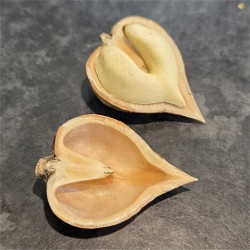Heartnut (Juglans ailanthifolia cordiformis)
A deciduous tree of vigorous growth, growing 50 to 100 cm or more in a year reaching a height of 15 m and a spread of 20 to 30 m. It is hardy to zone 4 it is in flower in June. The flowers are pollinated by Wind. The plant is self-fertile.
The kernels are eaten raw or cooked. They are also used in sweets, pies etc and have a mild and pleasant flavour, they can be eaten in quantity for dessert. The shell is easily cracked, and it is considered to be superior in taste.
Requires a deep well-drained loam and a sunny position sheltered from strong winds. Prefers a slightly alkaline soil. This is the hardiest member of the genus, it should succeed outdoors in most parts of the country. It is also resistant to most insects. The young growth in spring, however, can be damaged by late frosts.
Many heartnut seedlings revert back to Juglans ailantifolia and not Juglans ailantifolia var. cordiformis. That is, their nuts will resemble the thick-shelled Japanese walnuts. Some heartnut seedlings have a 70% chance of being just Juglans ailantifolia trees. Also those seedlings produced from the best heartnut parents will produce up to 90% heartnut offspring. Therefore we cannot 100% guarantee a true heartnut is produced.


